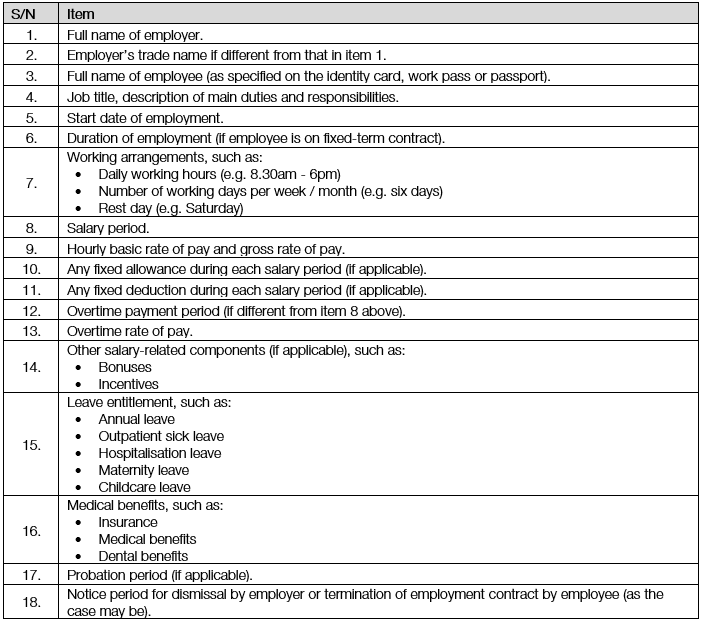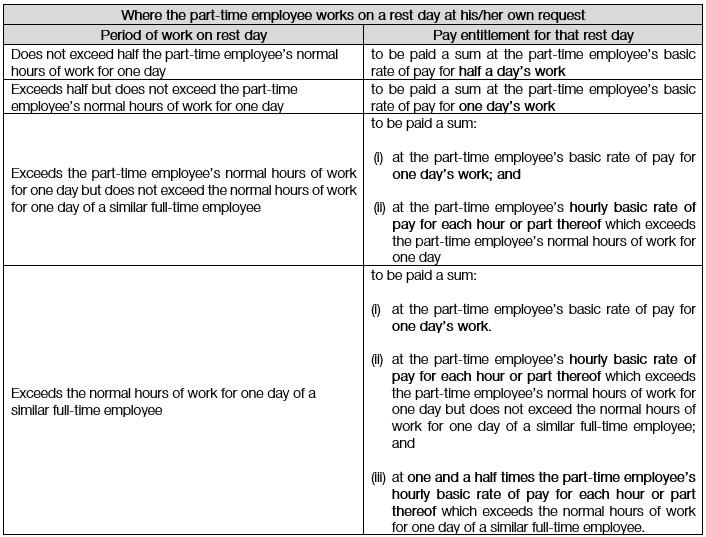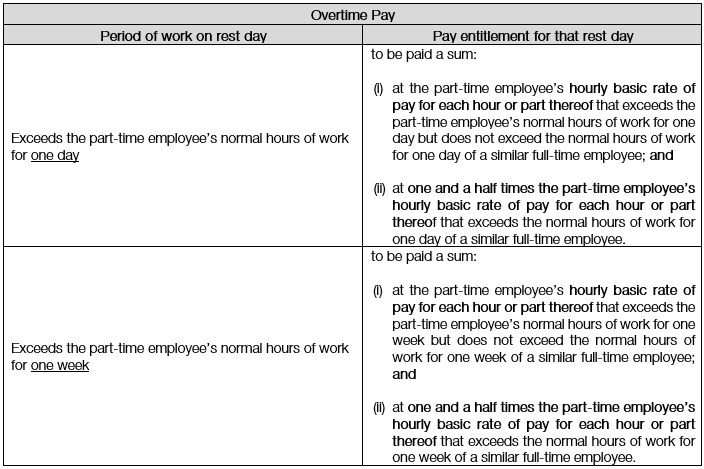Date Published: 23 March 2020
Authors: Pradeep Kumar Singh, Bill Jamieson, Wong Pei-Ling and Marvin Chua.
(a) Key employment terms
Employers are required to issue KETs in writing to all part-time employees who:
- are covered by the EA;
- are employed for 14 days or more; and
- employed under a contract of service for a continuous period of 2 weeks or longer. This refers to the length of contract, not the number of days of work.

Where a contract of service does not specify any of the items 7 and 9, that item is to be determined according to the formulas set out in paragraph 1, 2 or 3 of the Schedule to the Part-Time Regulations, as the case may be.
(b) Payment for work on rest day
A part-time employee who is required to work on 5 or more day and works on a rest day, whether at his/her own request or the employer’s request is entitled to be paid at a commensurate rate of pay, based on the employee’s hourly basic rate of pay and duration of work performed on that day.


(c) Overtime pay
A part-time employee who is required to work at the employer’s request beyond the part-time employee’s normal hours of work is entitled to be paid at a commensurate rate of pay, based on the employee’s hourly basic rate of pay and duration of work performed on that day.

(d) Holidays
Part-employees also enjoy entitlement to paid holidays on such (full working) days as are provided to full-time employees under the EA, but they are to be paid according to a formula set out in the Part-Time Regulations.
Notwithstanding the above, a part-time employee may be required by the employer to work on any public holiday and, in such event, he/she shall be paid a sum at his/her basic rate of pay for one day’s work in addition to the sum referred to in the formula above and to a travelling allowance for one day, if payable to him/her under the terms of his agreement with the employer.
Notwithstanding the above, a part-time employee (other than a Part IV Employee) who is required by the employer to work on any public holiday, is to be paid in accordance with the preceding paragraph (i.e. relating to rank and file part-time employees) for that day and may be given the following, in lieu of a day off in substitution for that holiday or a sum at the part-time employee’s basic rate of pay for one day’s work: (i) any part of a day off on a working day comprising such number of hours as may be agreed between the part-time employee and employer, or (ii) if there is no such agreement, either half of the part-time employee’s normal hours of work for one day off if the part-time employee worked for less than half of the part-time employee’s normal hours of work for one day; or the entire day off if the part-time employee worked for more than half of the part-time employee’s normal hours of work for one day.
(e) Sick leave
Part-time employees are also entitled to paid sick leave (please refer to section titled: “Sick Leave” at page 6 above) in proportion to the entitlement of a similar full-time employee provided by the EA, as calculated in accordance with the formula provided in the Part-Time Regulations.
(f) Childcare leave and maternity benefits
Part-time employees are also entitled to statutory childcare leave (please refer to section titled: “Childcare Leave” at page 8 above) in proportion to the entitlement of a similar full-time employee provided by the EA and CDCSA, where any employee has served an employer for a period of not less than 3 months; and has any child below the age of 7 years. The number of days childcare leave and the rate at which the employee shall be paid will be in accordance with the formulas in the Part-Time Regulations and the Child Development Co-Savings (Part-Time Employees) Regulations 2008.
Similarly, female part-time employees are entitled to statutory maternity benefits (please refer to section titled: “Maternity Leave” at page 6 above) in proportion to the entitlement of a similar female full-time employee provided by the EA and CDCSA. The length of maternity benefit entitlement shall be in accordance with the formulas in the Part-Time Regulations and the Child Development Co-Savings (Part-Time Employees) Regulations 2008.
(g) Non-compliance
A first conviction by any employer in failing to pay an allowance to a part-time employee who agrees to relinquish his entitlement to paid holidays or paid annual leave will result in a fine of S$5,000. A subsequent conviction for a contravention of the same provision within one year after the preceding conviction will result in a fine of S$10,000.
Please note that this section of the Employment Law Guide is a summary provided for general information purposes, aimed at aiding understanding of Singapore’s employment law as at the date of writing. It is not exhaustive or comprehensive and reading this memorandum is not a substitute for reading the text of the various statutes to fully understand the extent of the obligations owed. This guide should also not be relied upon as legal advice.
GENERAL DISCLAIMER
This article is provided to you for general information and should not be relied upon as legal advice. The editor and the contributing authors do not guarantee the accuracy of the contents and expressly disclaim any and all liability to any person in respect of the consequences of anything done or permitted to be done or omitted to be done wholly or partly in reliance upon the whole or any part of the contents.



